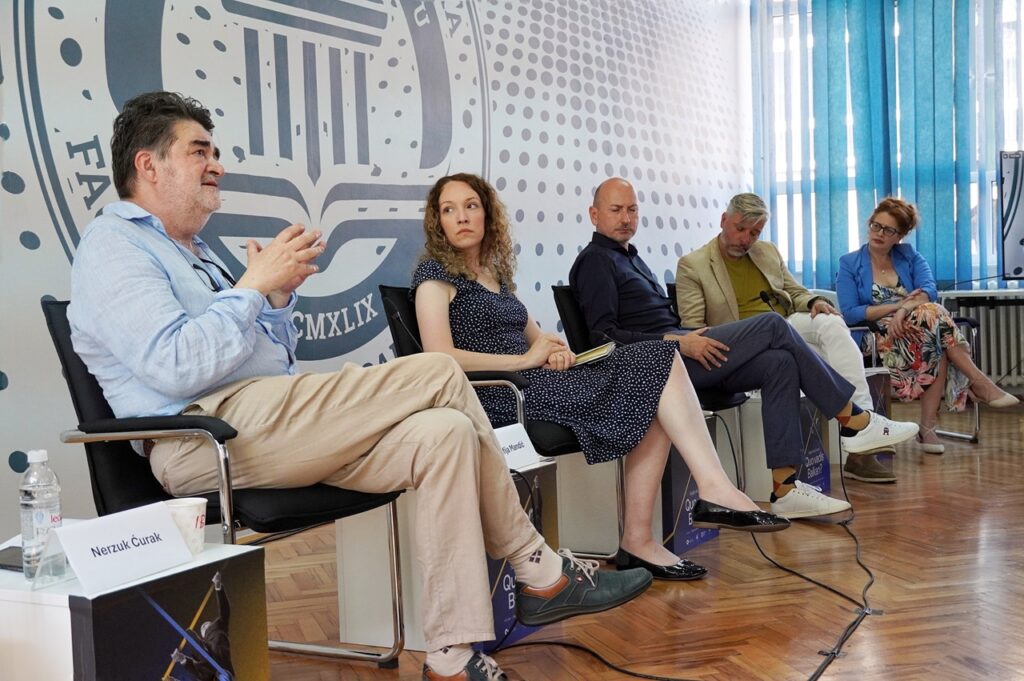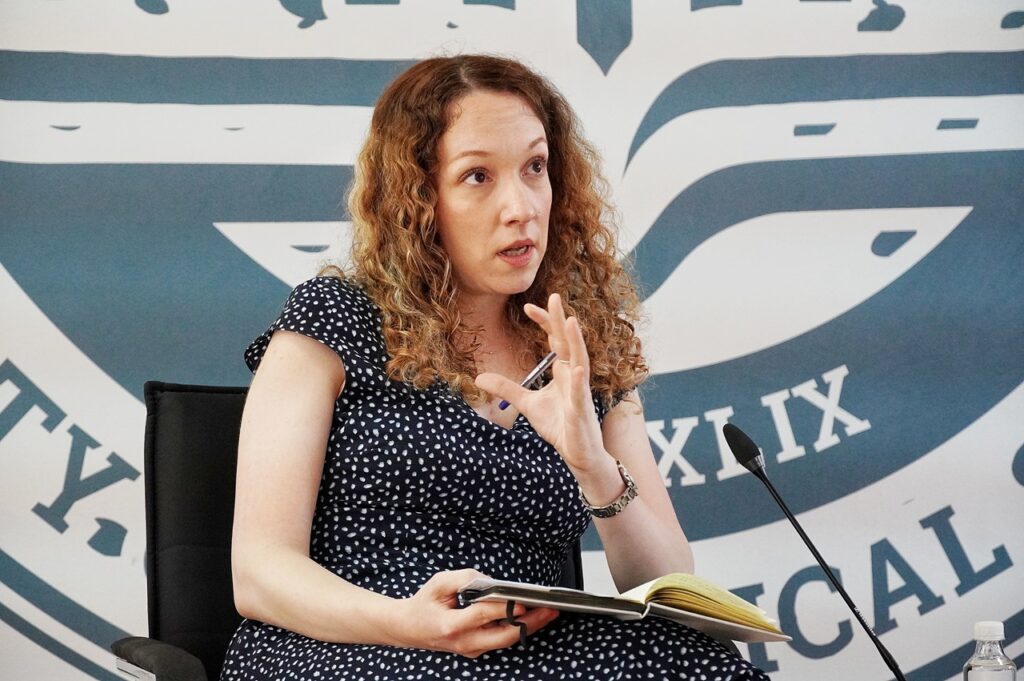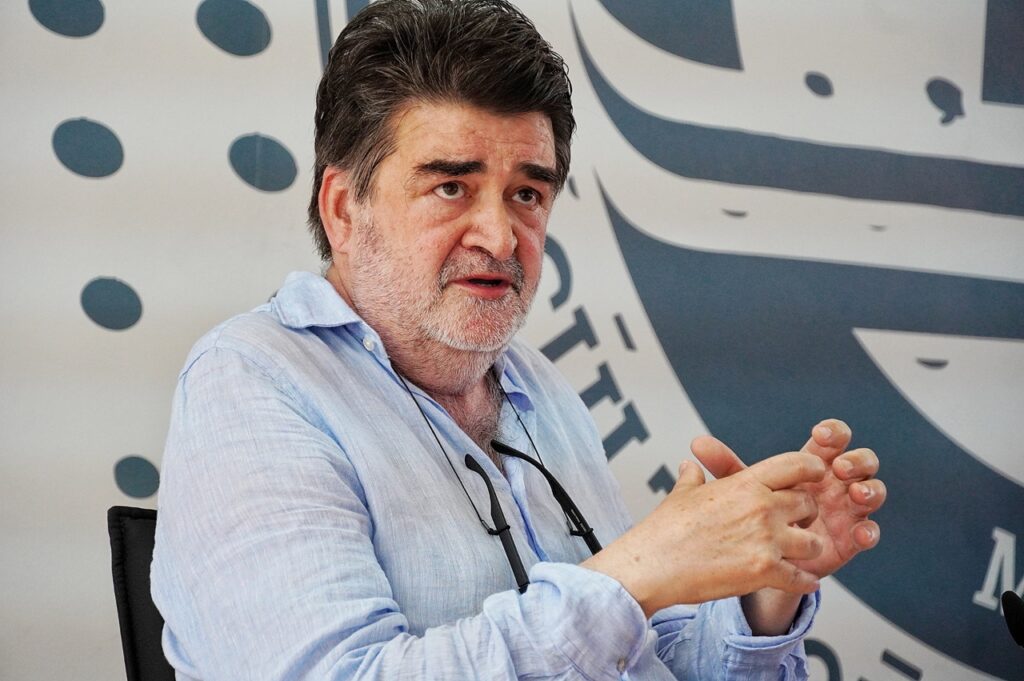The seventh, final panel at the Sarajevo Plenum was dedicated to civic values in the region. Director Andro Martinović, from CANU from Montenegro, historian Dr. Hrvoje Klasić from the Faculty of Philosophy of the University of Zagreb, Sofija Mandić from CEPRIS from Serbia and Dr. Nerzuk Ćurak, professor at the Faculty of Political Sciences of the University of Sarajevo, spoke about it, and the moderator was Prof. Dr. Sabina Bakić from the Faculty of Political Sciences of the University of Sarajevo.
“The Western Balkans should learn to balance between the fact that Europe is a peace project and that it is currently at war”, said Sofija Mandić, noting that Serbia is not fully committed to European values. “Serbia is in both an electoral and a constitutional crisis. This is a serious value defeat for Serbia, which has had free elections in the previous 30 years. That crisis has revealed that the regime, which is authoritarian, no longer has majority support, but also that it cannot be defeated in elections”, she said. Mandić emphasized islands of resistance in society – civil society in the academic community or in the non-governmental sector, as well as the free media, although they are reduced to a minimum. “Civil society and civic values in Serbia are in a state of hibernation and cannot be the bearers of significant changes in society… There is quite a gap between what is seen in the media and the official narrative and what citizens intimately think and feel,” she concluded, stressing the importance of education to drive change.
Andro Martinović believes that issues should be viewed in multiple dimensions and through different periods. “Our most frequent questions are still “what happened”. And it is not true that we do not confront the past. You can see that we constantly confront the past. For example, in my profession, Serbia does this all the time by making films and series about different historical points. However, the question is what kind of interpretation it is. It is most like a mirror from a fairy tale in which that confrontation takes place so that “I” am the most beautiful and the best in that mirror, which does not correspond to reality nor does it enable a real confrontation with the truth,” said Martinović. “A citizen is someone who constantly reflects on the world around them, not someone who is a mere bystanders in their own life. We need, above all, to build such a citizen”, he concluded.
Hrvoje Klasić recalled the war crime case in Štrpci from 1993, when a group of soldiers dragged out a group of people because of their nationality, which the vast majority of passengers watched silently, while one decided to react. “With that he demonstrated civic values - solidarity, responsibility, tolerance and civic courage. He paid for that with his life,” said Klasić. He questioned how far we have come from that in 2024 and how many observers there would be today versus those who would show civic courage. “If we look back in the past, we see that we did have civic values – through the partisan movement, former Yugoslavia, and a time when there was solidarity… There is no need to look elsewhere, it is enough to look at how we behaved in the past,” he reminded. “Croatia has made many improvements since joining the EU, but there is still a lot of work to be done. It is not Denmark, but it is ahead of the Western Balkans. Despite the shortcomings, today I do not think about whether the elections were stolen, I know that it is possible that, if an affair is discovered, the president or the prime minister will also end up in prison, I do not have the feeling that the state is cheating and embezzling me,” he stated.
“Finding a citizen in the absolute sense of the term is almost impossible today. Being a citizen means being radically independent. This is impossible, because our societies demand pure and one-dimensional identities that are incompatible with the concept of citizenship. We are witnessing a radical rejection of the idea of citizenship by Serbian and Croatian nationalism. These nationalisms treat the idea of citizenship as mimicry for the rule of the majority nation. In their view, the civic state is actually a Muslim state,” said Nerzuk Ćurak. He explained that in the real-political field, this produces many misunderstandings and leads to the dehumanization of Bosnian society. In this sense, he pointed out that the anti-fascist movement must become a place from which to build a civic society, as it embodies the idea of unity among Bosniaks, Serbs and Croats. Ćurak added that it is necessary to work on elementary small things and build a citizen. “Bosnia and Herzegovina, despite all the horrors, violence and aggression that occured, has retained elements of essential unity,” he concluded.
At the fifth regional plenum, Quo vadis, Balkans? which was held in Sarajevo, 42 experts from the academic community, the NGO sector, institutions, politics and the diplomatic community presented their views through seven panels and additional sessions.
The Sarajevo Plenum Quo Vadis, Balkan? is organized by the Regional Academy for Democratic Development (ADD) from Serbia, the Centre for Civic Education (CCE) from Montenegro, and the Faculty of Political Sciences of the University of Sarajevo (FPN US), with the support of the European Fund for the Balkans (EFB).



